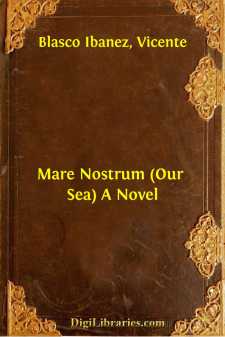Categories
- Antiques & Collectibles 13
- Architecture 36
- Art 48
- Bibles 22
- Biography & Autobiography 813
- Body, Mind & Spirit 142
- Business & Economics 28
- Children's Books 16
- Children's Fiction 13
- Computers 4
- Cooking 94
- Crafts & Hobbies 4
- Drama 346
- Education 46
- Family & Relationships 57
- Fiction 11829
- Games 19
- Gardening 17
- Health & Fitness 34
- History 1377
- House & Home 1
- Humor 147
- Juvenile Fiction 1873
- Juvenile Nonfiction 202
- Language Arts & Disciplines 88
- Law 16
- Literary Collections 686
- Literary Criticism 179
- Mathematics 13
- Medical 41
- Music 40
- Nature 179
- Non-Classifiable 1768
- Performing Arts 7
- Periodicals 1453
- Philosophy 64
- Photography 2
- Poetry 896
- Political Science 203
- Psychology 42
- Reference 154
- Religion 513
- Science 126
- Self-Help 84
- Social Science 81
- Sports & Recreation 34
- Study Aids 3
- Technology & Engineering 59
- Transportation 23
- Travel 463
- True Crime 29
Mare Nostrum (Our Sea) A Novel
Description:
Excerpt
CHAPTER I
CAPTAIN ULYSSES FERRAGUT
His first gallantries were with an empress. He was ten years old, and the empress six hundred.
His father, Don Esteban Ferragut—third quota of the College of Notaries—had always had a great admiration for the things of the past. He lived near the cathedral, and on Sundays and holy days, instead of following the faithful to witness the pompous ceremonials presided over by the cardinal-archbishop, used to betake himself with his wife and son to hear mass in San Juan del Hospital,—a little church sparsely attended the rest of the week.
The notary, who had read Walter Scott in his youth, used to gaze on the old and turreted walls surrounding the church, and feel something of the bard's thrills about his own, his native land. The Middle Ages was the period in which he would have liked to have lived. And as he trod the flagging of the Hospitolarios, good Don Esteban, little, chubby, and near-sighted, used to feel within him the soul of a hero born too late. The other churches, huge and rich, appeared to him with their blaze of gleaming gold, their alabaster convolutions and their jasper columns, mere monuments of insipid vulgarity. This one had been erected by the Knights of Saint John, who, united with the Templars, had aided King James in the conquest of Valencia.
Upon crossing the covered passageway leading from the street to the inner court, he was accustomed to salute the Virgin of the Conquest, an image of rough stone in faded colors and dull gold, seated on a bench, brought thither by the knights of the military order. Some sour orange trees spread their branching verdure over the walls of the church,—a blackened, rough stone edifice perforated with long, narrow, window-like niches now closed with mud plaster. From the salient buttresses of its reinforcements jutted forth, in the highest parts, great fabled monsters of weather-beaten, crumbling stone.
In its only nave was now left very little of this romantic exterior. The baroque taste of the seventeenth century had hidden the Gothic arch under another semi-circular one, besides covering the walls with a coat of whitewash. But the medieval reredos, the nobiliary coats of arms, and the tombs of the Knights of Saint John with their Gothic inscriptions still survived the profane restoration, and that in itself was enough to keep up the notary's enthusiasm.
Moreover the quality of the faithful who attended its services had to be taken into consideration. They were few but select, always the same. Some of them would drop into their places, gouty and relaxed, supported by an old servant wearing a shabby lace mantilla as though she were the housekeeper. Others would remain standing during the service holding up proudly their emaciated heads that presented the profile of a fighting cock, and crossing upon the breast their gloved hands,—always in black wool in the winter and in thread in the summer time. Ferragut knew all their names, having read them in the Trovas of Mosen Febrer, a metrical composition in Provençal, about the warriors that came to the neighborhood of Valencia from Aragon, Catalunia, the South of France, England and remote Germany....











